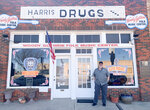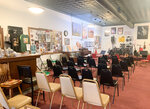




Located in historic downtown Pampa just on the other side of the railroad tracks is the Woody Guthrie Folk Music Center; the building and location itself rich in history (and controversy) that would make any history or music buff giddy with excitement.
Painted across the brick front of the Woody Guthrie Folk Music Center is ‘Harris Drugs’ depicted in its near-original font, a preservation of what the building was and still means to the story.
Upon walking in, the decor-ladden walls full of paintings, pictures, and other historical items dedicated to the late-great folk music icon grabs your attention and clings onto it until you’ve seen and read every fascinating piece.
From the pictures of a barely visible Pampa during the Dust Bowl to the displayed bouy obtained from the sinking of the USS Rueben James off the coast of Iceland in 1941 (the inspiration for Woody Guthrie’s song, The Sinking of the Rueben James), the fellow traveler or tourist can expect to wiggle their toes in the sands of time. Under the high ceilings containing the original tin material and design from the building’s conception, an open stage and seating area welcome guests and musicians from all backgrounds to come together for a jam session every Friday night.
While the man for whom the building commemorates is of absolute significance, the history of the location is just as interesting, especially for those life-long Pampa residents.
Executive Director of the board for the Woody Guthrie Folk Music Center, Michael Sinks, is not only a Woody Guthrie historical buff, but a Pampa history enthusiast as well.
Having moved to Pampa in 1989, Sinks worked for AT&T until his retirement in 2009, giving him more time to focus on his love of music and playing music.
After visiting the barber next door to the Woody Guthrie Folk Music Center, Sinks would be invited to a jam session that would put him on a path he never expected and the woman who would set him on that path was Thelma Bray, who is now 100 years old.
“The little lady that started this place, Thelma Bray, said they needed some help and asked me if I would come back Tuesday night,” Sinks said.
“So I thought maybe they needed to move a piano or something, but they were having a board meeting and she asked me to be on the board and I’ve been here ever since. I had just retired and was looking for a place to play music. It was completely self-serving, I just came to play some music,” he laughed.
Admittedly, Sinks didn’t know much about Woody Guthrie or his music, but a member of the board at the time, Pat Stewart who was a die-hard fan of Woody Guthrie, passed along his knowledge and passion for the folk singer to Sinks.
“He started telling me what books to read and telling me stories and introduced me to the family and I went to the music festivals in Okemah, Oklahoma where Woody was born and I just became enamored with the story; it’s Shakespearean. And the fact that he started his music career right here in this room,” Sinks said.
“He found his first guitar in the store room and he started fooling around with it and the boss told him, if you can play it, you can have it. So this is where it all started for Woody.”
Harris Drugs was owned and operated by Carl “Shorty” Harris, formed during the oil boom in the late 1920s that affected the entire Texas Panhandle.
Trying to find a way to make money during a time when oil field towns were less than friendly to most people, Shorty set up a lemonade stand out on Highway 60.
From the advice of a traveler, Shorty learned how to turn a profit from his simple lemonade stand and turned it into a hamburger stand.
After a few years’ worth of savings, Harris, along with a business partner, bought the newly constructed building that would become Harris Drugs.
Across the street from Harris Drugs was a boarding house that out-of-town oilfield workers would stay and the 25-cent-per-8-hour cot rental would be managed by none other than Woody’s father, Charley who would hire his then 17-year-old-son.
Prohibition was in effect during that time and while most drug stores were known to sell ice cream and root beer and other various items, “special medicine” was also sold under the prescription of a doctor.
“So drug stores popped up everywhere, kind of like medical marijuana dispenseries today. But Woody was told when he went to work here that if somebody put down a nickel, they wanted ice cream or root beer. If they put down 50 cents, reach under the counter and get one of these bottles in a paper sack and don’t ask any questions,” Sinks smiled.
Thelma Bray was going to school during the time that Woody Guthrie was working and playing music in Pampa and had no idea until later on when she read a book about his life.
“She went to a town hall meeting and stood up and said I want to do something to recognize Woody Guthrie as a worldwide famous musician who started here in Pampa, Texas. One of the people said that Woody Guthrie was a communist and an atheist and we’ll have nothing to do with him in Pampa. Neither one of those statements were true, but it didn’t matter,” Sinks said.
“She didn’t let that stop her. She was kind of a mover and a shaker around here. She was one of those people that didn’t let “no” dissuade her. She started looking for other people that were like-minded and thought that something should be done to honor Woody Guthrie and she found some people and started a 501C3 in 1992 called Pampa’s Tribute to Woody Guthrie and they had their first concert that year that had all sorts of names including Debbie Gibson.”
After Harris Drugs had closed, it has since been a leather shop, a shoe shop and a bar, but after its final closure, Thelma set her sights on buying the building.
In 2002, the ten-year project was finally coming to its completion after they bought the historic building with the help of many of Pampa’s well-known citizens at the time.
After a lot of rennovations and clean up, the Woody Guthrie Folk Music Center became what it is today, and according to Michael Sinks, it’s more than just a museum.
“I underestimated the power of Woody Gutherie’s name because people did come,” he said, pointing to the massive painted canvas of a boxcar with hundreds upon hundreds of signatures of visitors and musicians from all over the world that have stopped through to pay Pampa’s hidden gem a visit.
“People kind of take some ownership of this place. Usually when they come to visit they often stay for 2 to 3 hours and we’ll just talk. I’ll tell them all the stories I know about Woody and they’ll tell me their stories,” he said.
“Some people have an idea in their head about what folk music is, but the real definition of folk music to me is folks getting together to play music. That’s what this place is for and that’s exactly how I got here.”
Because the Woody Guthrie Folk Music Center is completely nonprofit and is free to the public, the center does rely on donations and funding from certain organizations to keep up its operation.
But with the outpouring of love and support from the community and from folks all around the world. the spirit of Woody Guthrie is still live and well in Pampa.
Visit the Woody Guthrie Folk Music Center at 320 S. Cuyler Tuesday through Friday from 10 AM to 5 PM and join in on the jam sessions on Fridays from 6 PM to 8:30 PM.